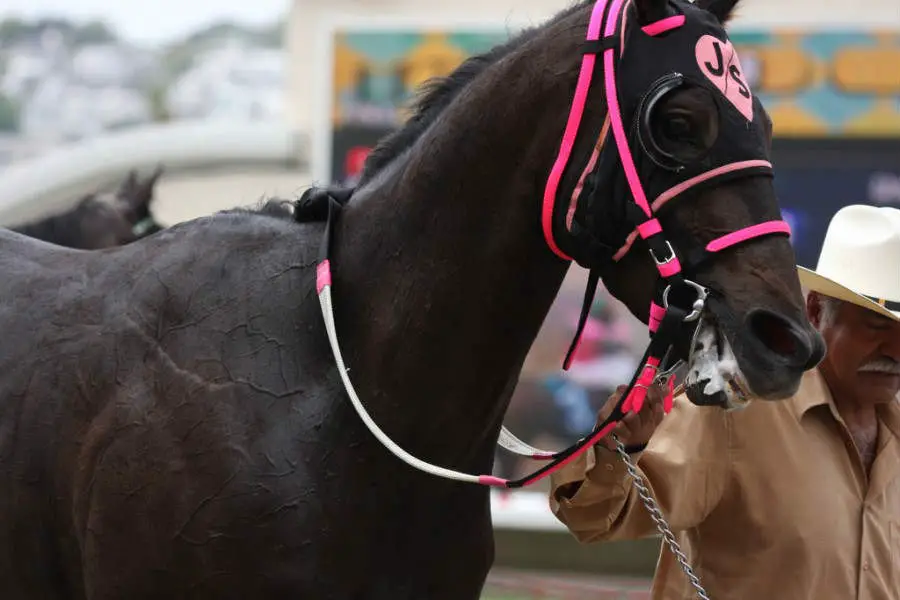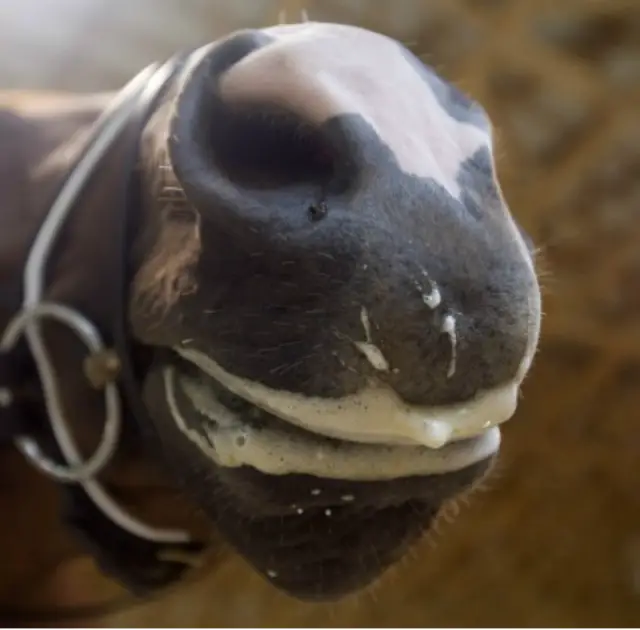Last Updated on July 31, 2020 by Allison Price
The foam you see in a horse’s mouth is usually caused by them salivating. Although this is normal, salivating can also be link to oral pain. It can lead to mouthiness and licking. This also usually happens during feeding time when saliva production increases.
Oral pain in horses’ age two to three years are quite common. Foals usually shed 16 baby teeth and erupt 16-20 permanent teeth. When some of those baby teeth stay too long in place, they can become loose, sharp, or otherwise painful to the horse. Baby teeth and new permanent teeth are quite soft and very easy to develop its edges into sharp points.
Reasons of Horse’s Foamy Mouth
In some cases, a foaming in the mouth can signify a medical condition requiring a visit from the vet. Clinical syndromes that can cause profuse salivation are the following:
Vesicular stomatitis
Vesicular stomatitis is a foreign animal disease affecting horses, cattle and swine. It causes oral vesicles marked by excessive salivation and chomping.
Chemical irritation on the Mouth
This results from horses grazing on plants that have sharp awns, spines, burs, and etc,. It may have substances that can cause irritation in the mouth.
Slaframine Poisoning
It is usually associated with a pasture or hay that has fungus. Rhizoctonia leguminicola fungus may grow in contaminated hay. This fungus causes excess salivation, lacrimation, colic and diarrhea. This is not life threatening, to be precise. No treatment is necessary, except changing the horses’ feed.
A Sign of Stress or Exertion
A horse that is usually overworked may produce foam. That is the body’s mechanism for trying to cool itself down faster which is necessary for a flight animal. A tense horse will foam in his mouth.
A Sign of Illness
If you see a horse with red or pink-tinged foam, consider it a call for help. Red or pink foam means that there is likely blood present somewhere. This should be check by a veterinarian for further assessment.
A Sign of Relaxation

In Equine World, seeing foamy mouths in horses is usually considered to be a good thing. Dressage enthusiasts look for happy foam. Happy foam is a relaxed horse that is on the bit and engaging with the rider. A horse with proper dressage form that uses its whole body will also produce more saliva.
Choking on Unknown Substance
Horses can get up to all sorts of shenanigans in the pasture, including eating things they shouldn’t. If your horse is acting strange in the pasture, they may have a stick or other foreign body lodged in their throat. This will also cause coughing and foamy mouth. If you think this is the case, call your veterinarian right away!
Eating, Drinking, and Chewing
Horses with foams are just okay during this activity. Lathering help horses eat and digest the vast quantities of dry food that they have to consume in a day. In return, they produce between 3 and 10 gallons of saliva a day. Hypersalivation is the excessive production of saliva – your horse may drool and dribble.
A Sign of Rabies
An infected horse or any animals has the tendency to have foamy mouths. Horses with rabies can exhibit a wide variety of symptoms, and individual cases may vary. Since it’s transmitted through saliva, infected horses are a risk to humans and animals. You can prevent this by having them vaccinated.
Horse’s Bit
Bit is a piece of metal that is usually attached to a bridle. It fits in a horse’s mouth – resting over the tongue on gaps between teeth called “bars”. If a horse is chewing on the bit, the excess saliva will often dribble from their mouths and churn up some foam.
Uncommon Diseases
Equine viral arthritis
It is often confused with other equine respiratory diseases. This virus can cause permanent damage to young horses and their offspring.
Borne disease
This virus can cause paralysis and death, particularly to horses and sheep.
Non-transmissible diseases:
- Musculoskeletal deformities – whether a horse was born with them or they’re a result of injury to the face or neck
- Mouth deformities
- Tongue deformities
Is it good for Horses to have Foamy Mouths?

Most likely. Foams on horses’ mouth indicate a physical reaction from its rider and a relaxed state of mind. Horses chew more gently, move their tongue and swallows that’s why they salivate. This is which in turn helps the relaxation of the jaw and poll. It also means that their jaw softens and that the horse is accepting the bit. It lets the saliva flow rather than tightening his mouth. All in all, it is a positive trait.
3 Ways to Have your Horse with a Foamy Mouth
- Make sure your horse has a good posture. You have to worry about how he lifts his back and bends his neck to crane. This is so that the salivary duct is not inhabited and the mouth does not dry out.
- Some riders will give their horses a bit of apple or a sugar cube before a competition. Eating encourages the saliva to flow.
- Give them something to chew on, as this produces excess saliva.


